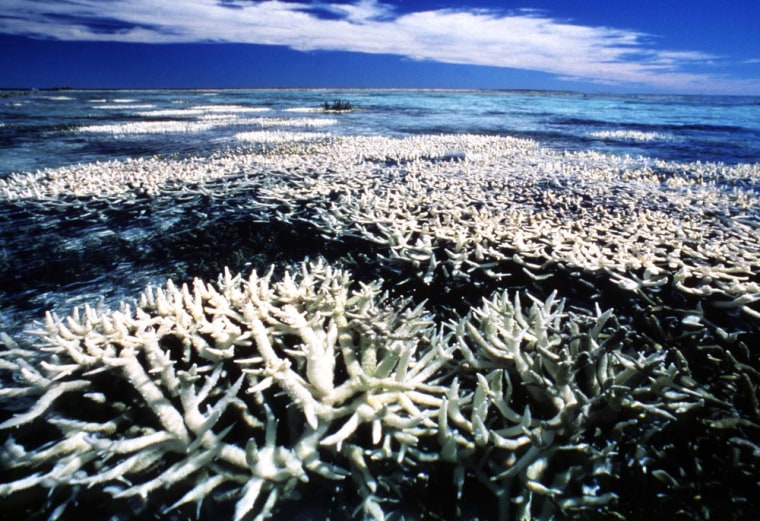Up to half of the world's coral reefs may disappear by 2045 unless urgent measures are taken to protect them against environmental hazards, particularly climate change, the World Conservation Union said in a report released Tuesday.
The Swiss-based organization called for the establishment of more protected marine areas to shelter the coral reefs from commercial fishing and pollution, where they could become more resistant to a deadly process known as bleaching.
"Twenty percent of the earth's coral reefs, arguably the richest of all marine ecosystems, have been effectively destroyed today," said Carl Gustaf Lundin, head of the agency's marine environment program who helped write the report "Coral Reef Resilience and Resistance to Bleaching."
"Another 30 percent will become seriously depleted if no action is taken within the next 20-40 years, with climate change being a major factor for their loss," he said in a statement. Raw sewage and farm runoff are other contributors, experts say.
Many coral reefs die because of bleaching, caused by rising surface temperatures at seas and higher levels of sunlight due to climate change. As the temperature rises, the algae on which corals depend for food and color die out, causing the coral to whiten, or "bleach."
Prolonged bleaching over ten weeks eventually kills the coral.
"Current predictions are that massive coral bleaching will become a regular event over the next 50 years," Lundin said.
U.S. report
In Washington, the National Oceanic and Atmospheric Administration reported Tuesday that “a major coral bleaching event is underway in the Caribbean and may result in significant coral death in much of the region.”
“Currently, the bleaching is centered in waters adjacent to the U.S. Virgin Islands,” NOAA said in a statement. “Reports of bleaching have come in from the Florida Keys and Texas' Flower Garden Banks in the north, to Tobago and Barbados in the southern Antilles, to Panama and Costa Rica in the west.”
NOAA said surveys show 85 to 95 percent of coral colonies were bleached in some reef areas.
Pitch for marine parks
In its report, the World Conservation Union said marine parks reduce the stress on coral reef ecosystems by reducing the impact of pollution and overfishing.
The report also recommended a strategy for the establishment of a global marine park network in the face of climate change, covering all important marine ecosystems including coral reefs.
Other key strategies to enable coral reefs to be more resilient to bleaching are sustainable fisheries management and integrated coastal management, the report found.
"Destructive fishing practices such as blast or poison fishing can make coral reefs more vulnerable to bleaching," said The Nature Conservancy's Rod Salm in a statement. "It can decrease coral cover or deplete fish populations that are important for the coral reef ecosystem."
The full report is online at www.iucn.org.
